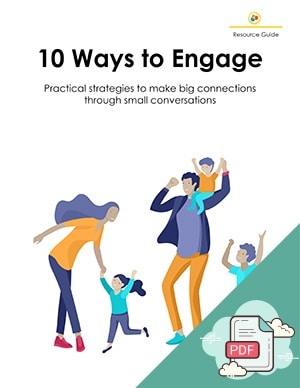Screens, tablets, and smartphones are everywhere and an integral part of our lives. We are clearly parenting in the digital age. We use devices to communicate, take pictures, gather and share information, entertain ourselves and our children, watch the news, watch fun videos that others create, and create our own “stuff” to share.
The availability of media and social media has had a profound impact on the way we, as parents, gather information and interact with others. We clearly live in the age of screens, media, and social media.
As parents, an important question we should ask ourselves is how growing up in the age of screens affects our kids and what we can do to support their success in life!
What’s very clear in all of the research and information (and there is tons of it) is the implications and impact of screens, tablets, and smartphones affect us all differently depending on our age. With this in mind, we’ll use age as the key way to talk about and discuss the impacts of parenting in a digital age.
Knowing the impact of media and social media on your child plays a key role in the actions you take as a parent regarding your child’s use of media and social media. While there are no right or wrong decisions regarding how to guide your child’s use of media and social media, there is significant information available that can guide your decisions.
Ages 0-3

This is one of the most important periods of time for physical, cognitive (the ability to understand and reason), and emotional development for our children. The Raising Family Readiness Profile provides a set of key milestones to measure your child’s capabilities in each area.
In simple terms, the more we interact with our children physically, talk with them, share context by describing what’s going on, and fully engage with them enables their development physically, neurologically (brain), and emotionally. One of the key reasons is that at this age, our children learn by seeing, doing, and watching us and others around them.
The American Academy of Pediatrics, the American Psychological Association, and the World Health Organization recommendations are that children have NO screen time until 18 to 24 months, except for video chatting, and says kids ages 2 to 5 should get at most one hour per day of screen time.
A study presented in August 2022 by Frontiers in Psychology concluded that one of the key issues with screen time is that when kids just look at screens, and we don’t provide context for what they are watching and we don’t interact with them, their development is negatively impacted in terms of understanding speech, language development, lower cognitive/reasoning development leading to a lack of school readiness, impaired executive functions, and attention issues.
Bottom line, don’t give your little one a tablet or smartphone as a babysitter or to keep them occupied for long periods of time.
Ages 4-11

According to the Pew Research Center, over 80% of US parents with a child 11 or under allow their children to watch videos on YouTube, with 53% allowing their children to watch at least once per day.
Further, one-third of all parents allow their children to interact with a smartphone before the age of 5. In addition, 17% of children under the age of 12 have their own smartphone, while 75% of parents don’t think it’s okay for a child under 12 to have their own phone.
The primary reason given by parents for their children owning a phone at this age was not for doing homework (9%) or because friends had phones (6%) but rather to make it easier to contact them (73%).
Roughly 7 in 10 parents say that smartphones will hurt a child’s ability to develop healthy friendships and learn social skills. More than half of parents say they spend too much time on their smartphones.
What does all of this tell us? We live in a world where kids want more screen time, parents believe that their kids need less but also want their own screen time, parents want to be able to contact their kids and vice versa, AND we live in the age of screens.
Ages 12 and Over

In the article 5 Windows of Opportunity to Making Childhood Extraordinary, we talk about the ages at which our kids develop key capabilities, including emotional control, math/logic skills, vocabulary, motor development, spoken language, and instrumental music. All those windows are before our kids turn 12.
So, what is our role as parents after that age? Engage, engage, engage!! Just like mentioned above, put down that smartphone and spend time with your kids doing more than just saying, “Good morning; how are you; there is your breakfast; see you after school!”
While life is busy, create family time now to share doing things together, not just have everyone sit around looking at their phones together! When spending time with their kids, 68% of parents say that, at least sometimes, they are distracted by their phone, and 4 in 10 parents say they don’t spend enough time with their kids. It’s time to assess how you are doing.
Free Resource Guide
10 Ways to Engage
Practical strategies to make big connections through small conversations
There are no easy answers, but there is a way for us, as parents, to bring order to the wild world of ubiquitous, 24-hour-a-day screen time by creating a family media management plan for the whole family. The link provides a simple way to put one together that involves everyone in the family. An important aspect of the family plan is that it needs to be for the whole family, kids and parents alike.
I recall when we were teaching one of our in-person classes, Leading Your Child to Success, one of the students shared with the class that she was sitting on the edge of her bed when her 17-year-old daughter walked in and sat down beside her.
Focused on her smartphone, she didn’t acknowledge her daughter until she heard the words, “Mom! I’ve been sitting here for five minutes! Can you pay attention to me and not your phone!” That’s a telling story for all of us.
We don’t develop relationships on the phone; we just share information. We develop relationships when we interact and discuss. We read body language and make eye contact. That’s what we want our kids to do. We need to start at an early age, so make your family media/smartphone/social media plan now.
Spend Quality Time While Parenting in the Digital Age
Our kids want to use media sooner than they should. Deciding to delay and minimize the use of media and social media until the right time is one of the hardest decisions for parents to make.
Spending quality time with your kids is one of the most important things you can do while parenting in the digital age. Make Family Meetings a priority as a way to put down smartphones and spend time making meaningful connections.
When it comes to family meetings, there are lots of things to discuss when it comes to media and the age of screens. For example, 14% of middle and high school students have received a sexually explicit image from a boyfriend or girlfriend.
Of those same-age students, 43% were asked to send a sext by someone who was not a romantic partner and complied with that request.
Surprised? Respondents to a study aged 19 or older said 77% of them sent a sext in the US, while 88% had received a sext. This is not a point of judgment; it’s a point of information to discuss with your kids.
We need to make sure our kids learn how to interact in person, not just on phones. We need to interact with them and provide context for what is happening around them. They need to be able to read body language and make eye contact. Without interpersonal skills, our kids will be at a disadvantage as they grow.
At some point, your kids will be looking to make their own way financially and will interview for a job. One of the top complaints from hiring managers is that job applicants won’t look someone in the eye, a critical skill for success. Don’t let your kids look at the floor and elsewhere when you’re in a conversation with them. Look them in the eye and they, you.
These days, interviews happen in person and online. If your child has strong interpersonal skills, they should transfer online. If an online interview makes your child nervous or they want to improve their interview skills, there are online courses to help. One course we recommend is Gain Confidence on Zoom for Job Seekers.
We live in the age of screens! We know that they are immensely helpful and potentially harmful. When it comes to our young ones, the best advice is to keep screens away from those who are less than 24 months old and limit exposure to screens until they are 5.
As your kids get older, have a plan about how you and your family will live in the age of screens. Don’t allow everyone to just sit around and use their smartphones and use your media plan to make sure that when you are together as a family, the smartphones go in a basket and you spend time together as a family.
Play a game, put a puzzle together, go to the park, play a sport, or plan your vacation. Those are what your kids will remember!
What To Do Next
1. Read more in the blog:
The Family Wisdom Blog shares valuable ideas across diverse topics.
2. Explore the Printables Library:
Our printables library is filled with must-have activity ideas, checklists, guides, and workbooks.
3. Subscribe to Our Newsletter:
Sign up for our newsletter for parenting tips to help you create the family team you've always wanted.
Rick Stephens
Rick Stephens is a co-founder of Raising Families. With 33 years of experience as a top-level executive at The Boeing Company and having raised four children of his own, he is able to support parents and grandparents by incorporating his knowledge of business, leadership, and complex systems into the family setting.
In his free time Rick enjoys road biking, scuba diving, visiting his grandkids, and generally trying to figure out which time zone he’s in this week. Read full bio >>




